Campaigning in Cambridge: CULC
Labour: old dogs, new tricks
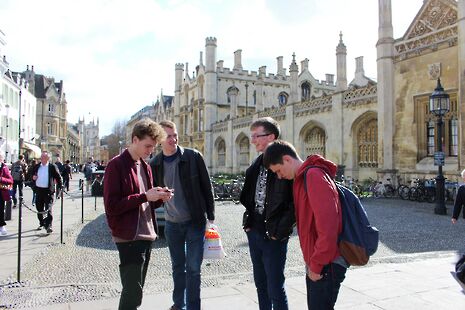
In the shadow of the Soviet flag in King’s Bar sits the Executive Committee of the Cambridge Universities Labour Club (CULC), scarlet cards and crumpled leaflets spread haphazardly over a table. I have never seen a more exhausted-looking group of activists: when I see them on Sunday 19th April, they are nine days into their ten-day pre-election campaigning blitz, known as CULC Camp. When I arrive, they are putting the finishing touches to their plan for today’s voter registration drive, the day before the deadline.
“We’re all so tired,” say two of them in perfect unison. “We’re all completely dead till we get to the doorsteps,” says Holly Higgins, “But then…” She mimes perking up, grinning, opening her eyes wide in the manner of a serial murderer.
Something catches her eye, and she snatches up a Liberal Democrat leaflet.
“Are you actually serious?” she shouts, drawing looks of alarm from her comrades. She frantically indicates to a piece of Huppert campaign material distributed to Cambridge colleges which claims that Labour pledged to abolish tuition fees in 2010.
“We never said that! That’s a flat-out lie!” says Rory Weal, the Chair of CULC. Rory is something of a celebrity, having made national news when he gave an impassioned speech to Labour’s national conference in 2011, at the age of 16.
It soon becomes apparent that what the letter is referring to is Ed Miliband’s preference, during the Labour leadership election, to abolish tuition fees and replace them with a graduate tax. The tax goes unmentioned.
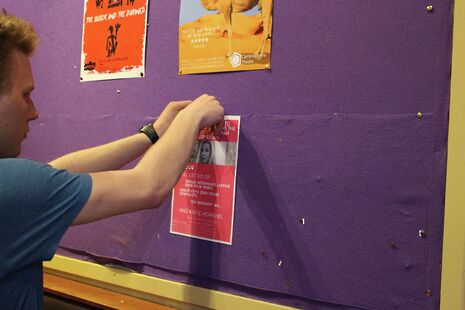
Tom Wilson, the campaigns officer, smirks and waves his phone to cheer the others up. “We broke a thousand retweets last night,” he says. He’s referring to the Katie Hopkins poster, which went viral the day before. Even the French press picked up the story.
It certainly seems to have struck a chord, but the Labourites around me don’t pay much attention to it: planning continues apace, with tactical chewing gum handed out and little cards distributed. The intention today is to knock on doors across fresher accommodation, as freshers were never registered by their colleges and had to register individually at this election.
I ask Rory if he has any concerns about knocking on doors when most people are preparing for exams, prelims or otherwise. He hesitates for a moment. “We do, yeah, and that’s why we’re not doing it on behalf of the Labour Party. The focus today is just on voter registration.” He gestures to the cards, which are indeed non-partisan besides a little drawing of a Labour-marked ballot paper going into a box.
The same cannot be said for the leaflets being handed out, nor the most perplexing piece of publicity that CULC have come up with: door-hangers, which are to be hung on the handles of freshers who aren’t in. SHOW THEM THE DOOR, they scream above the famous picture of David Cameron and Nick Clegg on the door of 10 Downing Street.
“This is what revolution looks like, guys!” says Holly, with only a hint of irony. They do seem to be more organised than the Liberal Democrats were, and far more so than the paid volunteers for CUSU. CUSU are running their own voter registration drive today, but a group of five of them are sitting across from CULC in the bar and are mostly sitting and chatting in front of a somewhat lacklustre board. One of them is wearing a braid of flowers in her hair. Nobody is talking to them as the final Labour groups are dispatched.
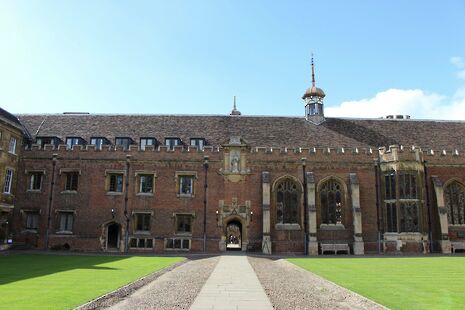
I head off with Rory and three other activists to John’s, as one of the group flits up and down the stairs, opening doors with his university card. I stand with Rory outside a fresher’s room, feeling faintly out of place. He knocks. There is a pause. Distantly, a toilet flushes. “Good start,” he says, knocking on the other three doors. Nobody is in, so we move on. Most people have already registered and several are international students who can’t vote, but everyone who answers is (surprisingly) receptive to the Labour group, even a man puffing up some stairs with a heavy-looking suitcase.
Going round the John’s fresher accommodation takes the best part of an hour. Towards the end, Rory takes a call and gives me a nudge.
“Would you like to speak to Cleo?”
Cleo Newton is the designer of the Katie Hopkins poster – truly the woman of the moment. I say yes, and soon I am talking to her in Second Court. She is quiet, though she speaks with nervous rapidity, and seems utterly bewildered by her newfound popularity.
“We wanted to do something with an edge, something different, something humorous,” she says. The timing was an accident, as the poster was designed and printed the day before her column in the Sun emerged, in which she refers to migrants drowning in the Mediterranean as being “like cockroaches”. CULC found themselves caught up in a perfect news storm.
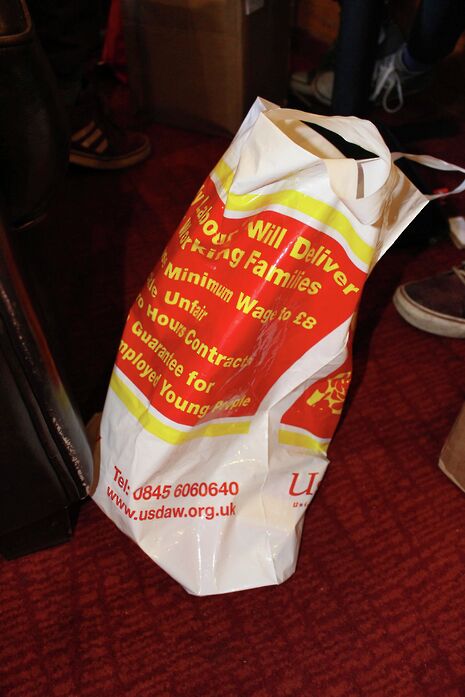
“We also wanted to show we’re a party with serious policies,” she continues, referring to the other pledges on the underoccupancy penalty, zero-hours contracts and unpaid internships, “but we don’t take ourselves too seriously. I think negative politics doesn’t really get through.”
Our time is up and we are whisked back to King’s to regroup and for the party members to receive their orders. The parliamentary candidate, Daniel Zeichner, is there giving the offending Liberal Democrat leaflet from earlier another roasting.
“They fixed that one,” says Zeichner flatly, referring to an exit poll from a recent hustings that showed the Lib Dems far in the lead on 40 per cent. “They shipped people in.”
Meanwhile, the talk of the table is a comment from UKIP’s candidate, Patrick O’Flynn, at last night’s hustings describing the audience as “the same 250 liberal middle-class do-gooders moving from hall to hall,” comparing it to the allegedly biased audience faced by Nigel Farage at the BBC Challengers’ Debate a few days before.
“I suppose if you know you’re going to lose, you might as well have some fun with it,” says Tom. UKIP does not look likely to win this seat, sitting at around 3 per cent in Cambridge polls; a lamppost outside bears a sticker saying LOVE THY NEIGHBOUR: SKIP UKIP. One Twitter user reacting to the video of O’Flynn’s comments described him as a “Thunderbirds villain made flesh”.
Next on the menu are several colleges lacking a present CULC member, among them my college, Emmanuel. I hesitantly raise a hand and offer to guide them to the fresher accommodation, emphasising my non-partisan credentials as a sort of protective incantation. Zeichner offers to come along, so I jump at the chance.
“We’ve met before, haven’t we?” he says suddenly on Petty Cury. Indeed we have: I interviewed him last term. He apologises for not recognising me sooner.
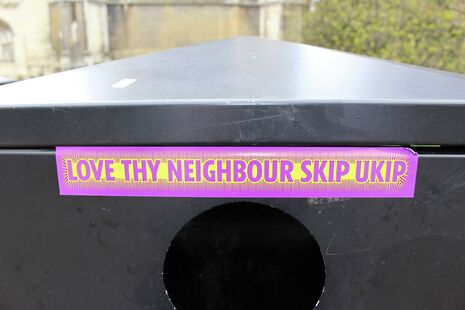
“When you’re in that semi-glazed state, things start to blur together.” I can understand. I’ve met Julian Huppert three times since I interviewed him and he didn’t recognise me once, but then again, he is a busy sitting MP.
By the time we get to the Emmanuel freshers’ accommodation in South Court, though, Zeichner is in his element. “I haven’t decided how I’m voting yet,” says one slightly bemused fresher as she opens her door.
“Well, let me try and convince you!” says Zeichner, beaming and striding across the hallway to engage her in conversation, for a good five minutes or so.
I talk to one of the Labourites, Fred Jerrome, about the candidate. Zeichner is now on his fifth attempt to get into Parliament, and his campaign got off to a rocky start after he only narrowly won the selection in 2012. Councillor George Owers described him as a “terrible candidate” at the time, and local gossip says the party divided over his selection.
“I like him. He’s very passionate about the stuff he’s running on, but there is that… candidate-itis,” says Fred. He shudders slightly. “All candidates get it. They love talking to people.” As we leave Emmanuel, the Labourites are falling over themselves in surprise at the positive response. Some are suggesting they do some more daytime campaigning, and we say goodbye to Daniel Zeichner.
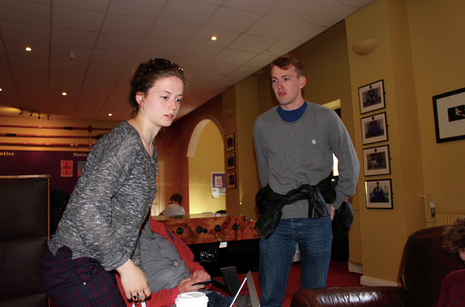
I part ways with Labour at King’s Bar once again, taking a few final photographs and listening in on logistical planning. The election is going to be very, very tough for both parties: Huppert seems to have a comfortable lead, but the strong student vote could overturn that, especially in light of the polling results released by Varsity today. Moreover, the Lib Dems have a doubly hard job, fighting to break a Labour majority in the City Council as well as defend their parliamentary candidate.
The next few weeks promise to be exhausting. Many of the students for both parties, are knowingly sacrificing good performance in their degrees to elect their favoured candidate, even finalists. There is more warmth and more professionalism in CULC, but the Cambridge Student Liberal Democrats have a strong record to defend and are flush with national money. Huppert remains a good advertisement for the Lib Dems. It is in their interests to keep him where he is, and in Labour’s to dethrone him.
Watching this hard, often fraught race play out, it is difficult not to be excited by democracy in action – and difficult not to think that whoever wins will have worked incredibly hard to get there. To the winner, the spoils – and God help the losers.
 News / Cambridge academics stand out in King’s 2026 Honours List2 January 2026
News / Cambridge academics stand out in King’s 2026 Honours List2 January 2026 Comment / Plastic pubs: the problem with Cambridge alehouses 5 January 2026
Comment / Plastic pubs: the problem with Cambridge alehouses 5 January 2026 News / Cambridge businesses concerned infrastructure delays will hurt growth5 January 2026
News / Cambridge businesses concerned infrastructure delays will hurt growth5 January 2026 News / AstraZeneca sues for £32 million over faulty construction at Cambridge Campus31 December 2025
News / AstraZeneca sues for £32 million over faulty construction at Cambridge Campus31 December 2025 Interviews / You don’t need to peak at Cambridge, says Robin Harding31 December 2025
Interviews / You don’t need to peak at Cambridge, says Robin Harding31 December 2025








